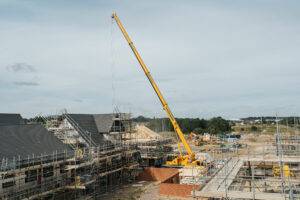Three local schoolchildren have won a competition to name robots at Donaldson Timber System’s (DTS) factory in Witney, the leading UK offsite timber frame manufacturer.
Pupils from Years 3 and 4 at West Witney Primary School took part in the competition after being taught about the installation work at the factory and receiving a lesson about timber frame and its sustainability benefits. They were then encouraged to come up with creative or ‘punny’ names for nine new robots, which are part of a live factory upgrade that will be completed this year.
The children submitted over 80 entries, which were all reviewed by a panel of judges at DTS including Managing Director, Rod Allan; Manufacturing Director, Frank O’Reilly; and the company’s Business Development Director, Mike Perry.
With two sets of three robots that work together, the first set will be named ‘Woody’, ‘Buzz’ and ‘Splinter’, chosen by Charlie aged 8. The second set of three robots will be called ‘Woody Woodpicker’, ‘Winnie Woodpicker’ and ‘Sarge’, suggested by Millie aged 9.
The final successful entry is ‘The Lumberghini’ proposed by Clara aged 9, which will be the name of DTS’s new beam saw.
The robots are being installed as part of a large investment programme in DTS’s state-of-the-art factory to help increase capacity to produce its Sigma® II closed panel product. This is an award-winning closed panel timber frame system that achieves high levels of fabric performance for new homes.
Each winner was presented with a trophy and a £25 Amazon gift card at the school’s assembly. DTS has also donated £250 towards West Witney Primary School’s library upgrades for the next academic year.
Mike Perry from Donaldson Timber Systems said: “The robots are a welcome addition for our DTS team as they will help our manufacturing team in their daily roles, especially with manual lifting. It’s been great fun working with children at West Witney Primary School to help name these brilliant machines, and we’re glad we could include the local community in this exciting new investment for our factory. DTS is proud to be an early adopter of robotics technology in our sector. They will help us make our current manufacturing process easier and more efficient, allowing us to work smarter.”
Jules Burgum, Year 4 Teacher at West Witney Primary School, added: “The children were fascinated about the whole process of building timber frames and the role of the new robots. They had fun thinking up creative names and are looking forward to seeing evidence of the robots in action. Thank you very much to the team at DTS for the opportunity.”
As part of the Donaldson Group’s Offsite division, DTS prides itself on being highly sustainable, innovative and efficient. With unrivalled experience and knowledge in offsite construction, DTS has an established history of bringing new commercial and operational innovations to the market. One example is the Sigma II closed panel system, offering near-Passivhaus standards of performance and sustainability. The system is being widely used with housing developers, particularly with those driven by whole life costs and fabric performance, contributing positively to fuel poverty challenges.
